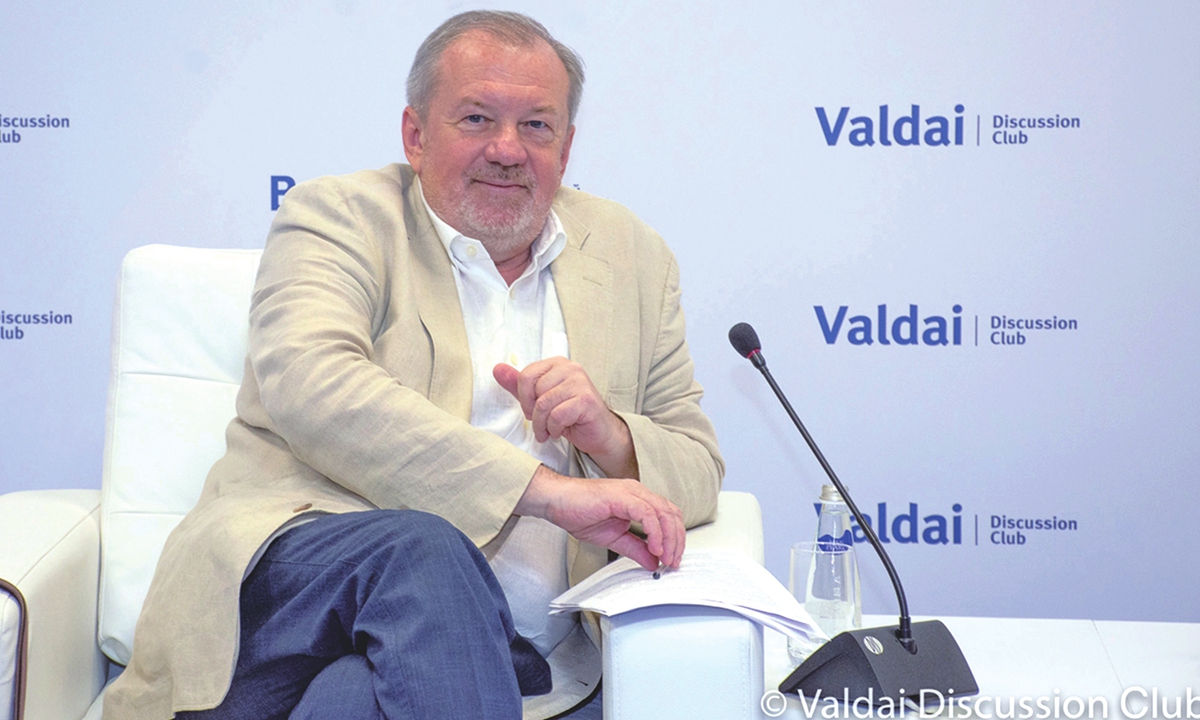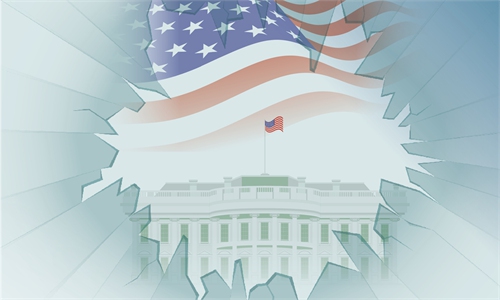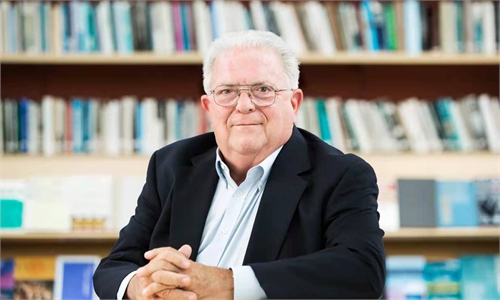By fueling anti-Chinese, anti-Russian sentiments, NATO may set world on fire: Russian scholar

Andrey Bystritskiy Photo:Courtesy of Bystritskiy
Editor's Note:
The US hasn't stopped its attempt to unite allies and contain China and Russia. As 2021 comes to an end, how will the relationship between China, Russia and the US develop and will there be another Black Swan event? Facing Western containment, in what areas can the China-Russia relationship deepen? Andrey Bystritskiy (Bystritskiy), chairman of the Board of the Foundation for Development and Support of the Valdai Discussion Club, a Moscow-based think tank and discussion forum, shared his thoughts with Global Times (GT) reporter Li Qingqing on these issues.
GT: In what field do you think a Black Swan event is most likely to occur in 2022? Is it in the relations among major powers, economic events caused by the COVID-19 pandemic, or a small event that triggers an overall impact?
Bystritskiy: Unfortunately, anything can happen, from the escalation of the pandemic due to the emergence of new strains, to natural disasters. Even an alien invasion is possible, although it is not so likely to happen. The most dangerous, however, is the escalation of conflicts between countries. These conflicts can happen in many forms, from economic struggles to cyber attacks, armed conflicts between armies managed by private military companies, and even simply terrorist organizations. Unfortunately, the elites in many countries often treat the global situation irresponsibly and take unnecessary risks. This is the case even in countries that seem to be completely civilized, such as in Europe.
GT: What are Russia's expectations for its relations with China and the US in the future?
Bystritskiy: In my opinion, relations between Russia and China are developing in the right direction. They can become a model for relations between countries. In a sense, stable, peaceful, equal and mutually beneficial relations stimulate the development of our countries, Eurasia and even the whole world. The development of Russia-China relations is an important element of the security system needed by everyone on our planet. The conversations between Russian and Chinese leaders and the US president are helpful. It is at least some kind of dialogue and it is better than nothing. However, holding talks alone is not enough. The American elites are split and it is very difficult to hope that they will behave constructively. The best that can be expected is the establishment of some kind of "truce" or the creation of a system of relations where everyone can live on their own without disturbing each other. There are hints that it is possible to create such a system of world order but we should not be too optimistic.
GT: Recently, many Western media outlets have hyped that China and Russia would launch simultaneous military operations against Taiwan island and Ukraine, claiming that this will pose a threat to the US-led international order. What do you think of such concentrated attack against China and Russia?
Bystritskiy: A media blitz on our countries in the Western media has, alas, become the norm. In general, they reflect the unstable situation in Western countries. Attacks on Russia and China help maintain the sprawling unity among Western countries and attach importance to NATO's existence. The problem is that Western countries, and above all the US, have lost their leadership and are unable to maintain the previous world order. Hence, they now have a desperate desire to manipulate public opinion. They say, "There are threats from Russia and China, so let's take action." But it seems that they do not believe in themselves. Moreover, there is growing internal criticism of this position in NATO countries. However, the situation is dangerous. By inflaming anti-Chinese and anti-Russian sentiments, NATO countries risk accidentally setting the whole world on fire.
GT: In an interview with the Global Times this month, historian Paul Kennedy said the current close China-Russia relations are a "temporary convenience alliance." His views are representative in the West. How do you view such a misunderstanding? Under the continuous Western containment, in what areas will the China-Russia relationship deepen?
Bystitskiy: Many people are trying to pass the desirable as reality. It is difficult for the Western elites to accept that countries like China and Russia can actually manage without them and live on their own. I think the center of world development is shifting to Asia and this means that Asian countries will cooperate. There are the deepest reasons for this cooperation because the sustainable development of the entire macro-region is impossible without some kind of integration. Russia and China, as I mentioned before, provide an example of such cooperation. It is based not on Western pressure, but on fundamental processes in Asia, a continent that is the largest part of the world in terms of territory, population and natural resources. Russia and China can constructively cooperate in practically all spheres: from defense to science, from education to the fight against climate change. And I want to note that there are areas where cooperation needs to be strengthened, above all, in the field of information. We need to get to know each other better.
GT: This year marks the 30th anniversary of the disintegration of the Soviet Union. President Putin once said that the fall of the Soviet Union was "a major geopolitical catastrophe of the 20th century." Is there still controversy in Russian society about the Soviet Union's choice at that time?
Bystritskiy: The Russian society is certainly still going through the disintegration of the Soviet Union. Older generations still remember the Soviet Union with all its merits and demerits, while younger generations rather dream more about the future. I have seen something similar in China too. For example, Liu Cixin, the author of the sci-fi novel Three-Body Problem, gladly describes the grandiosity of the Soviet Union and its science. How true are these notions? That is the big question. The problem, though, is that Russians are constantly being reminded of the past. The disintegration of the Soviet Union divided the Russian people, many of which now live in neighboring countries. In some cases, these people are discriminated and their rights are violated. For example, there is actually a civil war in Ukraine. However, it is not very intense so far.
GT: Many people compare the current competition between China and the US with the US-Soviet Union Cold War. How do you view the China-US competition and what do you think the final result will be?
Bystritskiy: I would not compare the Cold War with today's competition between China and the US. Back then there was a real ideological competition. The Soviet Union offered its model about the achievements of people's wellbeing and happiness, and the US offered its own. On the one hand, today we are living in a very integrated world - for example, in terms of information. But on the other hand, we are also living in a very divided world, with different value systems and approaches to development.
Ideologically, China and the US are not enemies but the US elites are worried about their exclusive position. They are also afraid of losing leverage on the global markets and the global situation as a whole. The current competition between China and the US could have many outcomes. We cannot rule out the most radical options including a direct conflict. Nevertheless, I hope that reason will prevail and the new generations of politicians will find ways to coexist that are more or less rational. The main condition for this is internal stability, cohesion of society, and above all, China and Russia.



